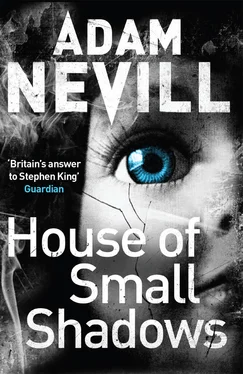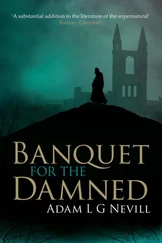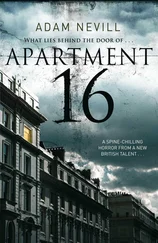Doctors had tried to medicalize her ‘condition’. The doctors, to whom she had been taken as a girl, claimed it was all kinds of things, as did the two specialists the doctors referred her to. At one time she was a narcoleptic, a catatonic, and suffered from hypnotic states. She was scanned and doctors with soapy hands and coffee breath kept looking into her eyes from close range.
No one ever asked what she saw when she was ‘out of it’. What she looked like seemed to be the most important thing to other people.
She could not slip away on command, though as a girl had wanted to. After a bad day at school, if she’d had a choice, she would have eagerly returned to wherever she went in a trance. In trances she experienced a joy so intense it made her nose bleed and left her body drained.
The trances occurred when she was tired, and it was like going to sleep with her eyes open. Sometimes it occurred when in deep thought, but only when relaxed. It was the most at peace she’d ever felt, being transported deep inside herself and far away from the world.
By her late teens the episodes almost never occurred. Then she was caught up in the ways of the world, and there was little sanctuary there. Anxiety, tension, despair aplenty, but little calm. She was partly relieved the trances had either gone into remission, or that she had grown out of them. It was difficult enough to fit in wherever she found herself, without passing out and dribbling through a gaping mouth. But part of her had come to secretly miss the condition too. It was the last thing that connected her to Alice. In the perpetual white noise of London anxiety, the episodes never came to save her. Only being drunk enough to stop caring about anything had helped her there.
But now they had come back.
Catherine wiped the blood off her top lip with the back of her hand. The nausea soon vanished with the dizziness. Memory had briefly dulled the jabs of pain in her stomach that Mike had left behind. Mike must have caused the relapse, so close to the place where it all began.
On Thursday someone delivered a letter to her flat by hand. They had gone by the time she scraped the latch off the front door and peered into the street she had not walked upon since the previous Friday night. It was addressed to her, care of the Osberne office. Leonard must have sent it on to her.
The heavy linen envelope was sealed with red wax like a court summons from the nineteenth century.
Feeling leaden and sore, as if she’d pulled every muscle in her abdomen while crying intermittently for a week, she opened the envelope on the breakfast bar.
The letter was from Edith Mason. Written untidily by hand on antique stationery, it was more of a curt request than an invitation to begin the valuation of the contents of the Red House the following day, Friday.
She’d only been away from the Red House for one week and her life had fallen apart. But she doubted even M. H. Mason and his rats could stitch it back together again.
Leonard sat beside her and held her hands. His touch was light, the palms of his hands dry. She didn’t know hands could be so dry. Maybe it was age. When she finally stopped crying and looked up, she noticed her boss’s small grey eyes were moist.
‘This scoundrel. This, this… bastard. I’d like to give him a piece of my mind. And more.’
The notion of the thin old man in the wheelchair enacting some kind of chivalrous revenge on her behalf was ludicrous. Sniffing, she began to giggle, but laughing made her feel as if she were also being unkind. ‘Look at me. What a mess. And bothering you with this. I’m sorry, Len.’ Outside the office, it was going dark. She’d only gone to work in the late afternoon to explain to Leonard the real reason why she had been missing for a week.
‘Nonsense. Nothing to apologize for. I’m flattered, and very glad that you have confided in me. Though I don’t understand it. Is he blind? A congenital idiot? I mean, to let you go? He’s a first-rate fool and I’d like to see him get his comeuppance. It would give me a great deal of pleasure to have a hand in it! Where does he live, Worcester you say?’
‘Please, Leonard. Don’t even think it. I can’t tell you how much it means to me that you’re even willing to listen. I’m being pathetic. But please don’t get involved.’
‘You are not pathetic. And we cannot account for the idiocy of others. My God, he’s looking a gift horse in the mouth. The way he has gone about this. It’s appalling. And not a word since to ask after you?’
As she recounted the whole sorry tale from the previous week, Leonard had not said a word, just winced and sucked in his breath. But she could tell he was genuinely upset, as if his own daughter had been jilted in a horrible fashion.
‘He doesn’t know what he wants. Thinks he does. Or did. He’s so directionless, listless, but then so angry. Like he’s still a teenager. But I couldn’t help being in love with him.’
‘Then you’re better off out of it. And it sounds to me like you can count on his downfall, if it’ll make you feel any better. And so will she, I’m sure, whoever this hussy is. Rest assured, my dear, justice has a peculiar way of making unexpected appearances. Any ideas who it might be?’
‘No idea.’
‘Best not to know. It won’t do you any good. And she’ll never be your equal. He’ll realize it too late. This is on him, not you.’
Catherine nodded. ‘I seem to bring it out in people—’ She stopped. Hearing her own paranoia out loud made her feel pitiful, even ashamed. ‘I don’t know why I am ever surprised.’
‘Now stop that. You are a beautiful and gifted young woman. Special. Unique. I don’t deal in anything else, my girl, and wouldn’t with a partner in this firm. Not everyone can see how exceptional you are. But there are plenty who can.’
Catherine looked at Leonard. His eyes had clouded and he looked past her, into the distance. ‘We’ve both seen enough of it. Exclusion. Mockery. Hurtful things. I know. I know.’ Leonard cleared his throat.
Now Catherine felt selfish and foolish, and even more childish, if that were possible. Here was a man in a wheelchair, disabled for all of a life he’d turned into a success. But nothing would have been easy for him. Perhaps that is why he still traded on the fringes, amongst the misfits and outcasts, where he’d also been manoeuvred. And had he ever known love?
‘The only defence,’ he no more than whispered, ‘is finding others. Like minds. And belonging.’ He turned to her and smiled. ‘Like us, kitten. Like it or not you’re stuck with me. We’re cut from the same cloth.’
‘A pair of nutters.’
‘That’s one word for it. Now, let’s get that dinner I owe you.’
‘You don’t. My treat. It’s the least I can do for putting you through this.’
‘Nonsense. And maybe we should postpone your trip to the Red House. I’m not sure Edith is a fitting antidote to what you’ve just been put through.’
‘No. I want this. For us. For the business. It’s too good. I won’t let him wreck it.’
‘You look pale, dear. And long in the face. Anything the matter?’ Edith said as Catherine wheeled her through the utility corridor. For today’s visit, Edith wore a tweed skirt and jacket, trimmed with leather, that looked to have been designed for outdoors as well as having the canny ability to pass as contemporary, and of quality. But so wizened was the elderly woman the clothes might have been handed out by a charity in the Blitz. Her skeletal hands were concealed again, this time inside a fur muff.
‘No. I’d rather not—’
‘Because you left here quite elated with what you discovered under our roof. You wished to return and I granted your wish. We have enough of our own troubles here without you bringing more to us.’
Читать дальше












